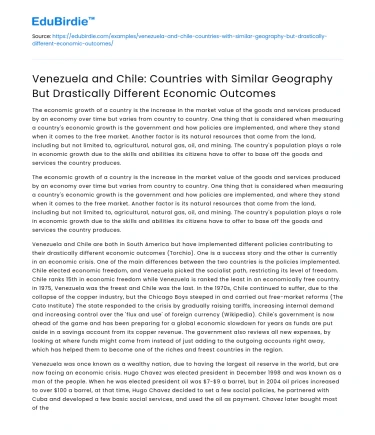The economic growth of a country is the increase in the market value of the goods and services produced by an economy over time but varies from country to country. One thing that is considered when measuring a country's economic growth is the government and how policies are implemented, and where they stand when it comes to the free market. Another factor is its natural resources that come from the land, including but not limited to, agricultural, natural gas, oil, and mining. The country's population plays a role in economic growth due to the skills and abilities its citizens have to offer to base off the goods and services the country produces.
The economic growth of a country is the increase in the market value of the goods and services produced by an economy over time but varies from country to country. One thing that is considered when measuring a country's economic growth is the government and how policies are implemented, and where they stand when it comes to the free market. Another factor is its natural resources that come from the land, including but not limited to, agricultural, natural gas, oil, and mining. The country's population plays a role in economic growth due to the skills and abilities its citizens have to offer to base off the goods and services the country produces.
Save your time!
We can take care of your essay
- Proper editing and formatting
- Free revision, title page, and bibliography
- Flexible prices and money-back guarantee
Venezuela and Chile are both in South America but have implemented different policies contributing to their drastically different economic outcomes (Torchio). One is a success story and the other is currently in an economic crisis. One of the main differences between the two countries is the policies implemented. Chile elected economic freedom, and Venezuela picked the socialist path, restricting its level of freedom. Chile ranks 15th in economic freedom while Venezuela is ranked the least in an economically free country. In 1975, Venezuela was the freest and Chile was the last. In the 1970s, Chile continued to suffer, due to the collapse of the copper industry, but the Chicago Boys steeped in and carried out free-market reforms (The Cato Institute) The state responded to the crisis by gradually raising tariffs, increasing internal demand and increasing control over the 'flux and use' of foreign currency (Wikipedia). Chile's government is now ahead of the game and has been preparing for a global economic slowdown for years as funds are put aside in a savings account from its copper revenue. The government also reviews all new expenses, by looking at where funds might come from instead of just adding to the outgoing accounts right away, which has helped them to become one of the riches and freest countries in the region.
Venezuela was once known as a wealthy nation, due to having the largest oil reserve in the world, but are now facing an economic crisis. Hugo Chavez was elected president in December 1998 and was known as a man of the people. When he was elected president oil was $7-$9 a barrel, but in 2004 oil prices increased to over $100 a barrel, at that time, Hugo Chavez decided to set a few social policies, he partnered with Cuba and developed a few basic social services, and used the oil as payment. Chavez later bought most of the country's private businesses and didn't see any harm in it due to having the assets to import the goods needed, but it destroyed the production of the country. As the oil prices went up, the money was spent, and nothing was put back for hard times. In 2012, Hugo Chavez became ill, around this same time other countries started noticing the spending habits of Venezuela and stopped lending to the country. Hugo Chavez dies in 2013 and Nicolas Maduro, handpicked by Chavez, was the next president. In 2014, the prices of oil started declining, and the government ended up being in extreme debt to the point when they didn't have the funds to buy basic food imports (Jazeera).
Venezuela needs help from its neighboring countries to restore basic functions, but with the current defaults on almost all its foreign bonds, it is unlikely. Due to the current currency value, the only option for Venezuela is to file bankruptcy. Afterward, the country should come up with a plan for recovery, if they can't file for bankruptcy maybe they can beg and plead with their neighboring countries for some bailout money. Venezuela may have to sell off some of its real estates or may have to be completely bought out. Venezuelans have already turned to their neighboring countries for refuge, looking for safety, stability and new opportunities. They might as well-just come together and join forces. The truth of the matter is that Venezuela is not going to recover, and it is going to get worse before it gets better.






 Stuck on your essay?
Stuck on your essay?

